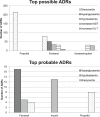Adverse drug reactions in therapeutic hypothermia after cardiac arrest
- PMID: 28382198
- PMCID: PMC5367663
- DOI: 10.1177/2042098616679813
Adverse drug reactions in therapeutic hypothermia after cardiac arrest
Abstract
Background: Therapeutic hypothermia (TH) improves survival and neurologic function in comatose survivors of cardiac arrest. Many medications used to support TH have altered pharmacokinetics and pharmacodynamics during this treatment. It is unknown if or at what frequency the medications used during TH cause adverse drug reactions (ADRs).
Methods: A retrospective chart review was conducted for patients admitted to an intensive care unit (ICU) after cardiac arrest and treated with TH from January 2009 to June 2012 at two urban, university-affiliated, tertiary-care medical centres. Medications commonly used during TH were screened for association with significant ADRs (grade 3 or greater per Common Terminology Criteria for Adverse Events) using three published ADR detection instruments.
Results: A total of 229 patients were included, the majority being males with median age of 62 presenting with an out-of-hospital cardiac arrest in pulseless electrical activity or asystole. The most common comorbidities were hypertension, coronary artery disease, and diabetes mellitus. There were 670 possible ADRs and 69 probable ADRs identified. Of the 670 possible ADRs, propofol, fentanyl, and acetaminophen were the most common drugs associated with ADRs. Whereas fentanyl, insulin, and propofol were the most common drugs associated with a probable ADR. Patients were managed with TH for a median of 22 hours, with 38% of patients surviving to hospital discharge.
Conclusions: Patients undergoing TH after cardiac arrest frequently experience possible adverse reactions associated with medications and the corresponding laboratory abnormalities are significant. There is a need for judicious use and close monitoring of drugs in the setting of TH until recommendations for dose adjustments are available to help prevent ADRs.
Keywords: adverse drug reactions; cardiac arrest; critical care; drug-related side effects and adverse drug reactions; intensive care; pharmacovigilance; therapeutic hypothermia.
Conflict of interest statement
Conflict of interest statement: The author(s) declared no potential conflicts of interest with respect to the research, authorship, and/or publication of this article.
Figures
Similar articles
-
Hyperglycemia and insulin resistance in cardiac arrest patients treated with moderate hypothermia.J Clin Endocrinol Metab. 2014 Oct;99(10):E2010-4. doi: 10.1210/jc.2014-1449. Epub 2014 Jul 17. J Clin Endocrinol Metab. 2014. PMID: 25033067
-
Frequency, types, severity, preventability and costs of Adverse Drug Reactions at a tertiary care hospital.J Pharmacol Toxicol Methods. 2016 Sep-Oct;81:323-34. doi: 10.1016/j.vascn.2016.04.011. Epub 2016 Apr 20. J Pharmacol Toxicol Methods. 2016. PMID: 27109493
-
Characterization of Severe Adverse Drug Reactions at a Free-Standing Children's Hospital.J Clin Pharmacol. 2019 Dec;59(12):1569-1572. doi: 10.1002/jcph.1494. Epub 2019 Jul 15. J Clin Pharmacol. 2019. PMID: 31309572
-
Therapeutic hypothermia after in-hospital cardiac arrest: a critique.J Cardiothorac Vasc Anesth. 2014 Jun;28(3):789-99. doi: 10.1053/j.jvca.2014.01.015. Epub 2014 Apr 18. J Cardiothorac Vasc Anesth. 2014. PMID: 24751488 Review.
-
Hypothermia after cardiac arrest: expanding the therapeutic scope.Crit Care Med. 2009 Jul;37(7 Suppl):S227-33. doi: 10.1097/CCM.0b013e3181aa5d0c. Crit Care Med. 2009. PMID: 19535951 Review.
Cited by
-
Outcomes and Adverse Effects With Peramivir for the Treatment of Influenza H1N1 in Critically Ill Pediatric Patients.J Pediatr Pharmacol Ther. 2019 Nov-Dec;24(6):497-503. doi: 10.5863/1551-6776-24.6.497. J Pediatr Pharmacol Ther. 2019. PMID: 31719811 Free PMC article.
-
Polypharmacy prior to in-hospital cardiac arrest among patients with cardiopulmonary diseases: A pilot study.Resusc Plus. 2020 Dec;4:100026. doi: 10.1016/j.resplu.2020.100026. Epub 2020 Oct 9. Resusc Plus. 2020. PMID: 33969325 Free PMC article.
-
Survival and neurological function in patients treated with extracorporeal membrane oxygenation and therapeutic hypothermia: a protocol for updating a systematic review.BMJ Open. 2024 Mar 25;14(3):e081207. doi: 10.1136/bmjopen-2023-081207. BMJ Open. 2024. PMID: 38531575 Free PMC article.
References
-
- Al-Senani F., Graffagnino C., Grotta J., Saiki R., Wood D., Chung W., et al. (2004) A prospective, multicenter pilot study to evaluate the feasibility and safety of using the CoolGard™ System and Icy™ catheter following cardiac arrest. Resuscitation 62: 143–150. - PubMed
-
- Arrich J. (2007) Clinical application of mild therapeutic hypothermia after cardiac arrest. Crit Care Med 35: 1041–1047. - PubMed
-
- Bell S. (2012) Effect of therapeutic hypothermia on drug metabolism. Neonatal Netw 31: 48–51. - PubMed
-
- Bernard S., Gray T., Buist M., Jones B., Silvester W., Gutteridge G., et al. (2002) Treatment of comatose survivors of out-of-hospital cardiac arrest with induced hypothermia. N Engl J Med 346: 557–563. - PubMed
-
- Bjelland T., Klepstad P., Haugen B., Nilsen T., Dale O. (2013) Effects of hypothermia on the disposition of morphine, midazolam, fentanyl, and propofol in intensive care unit patients. Drug Metab Dispos 41: 214–223. - PubMed
LinkOut - more resources
Full Text Sources
Other Literature Sources
Research Materials



